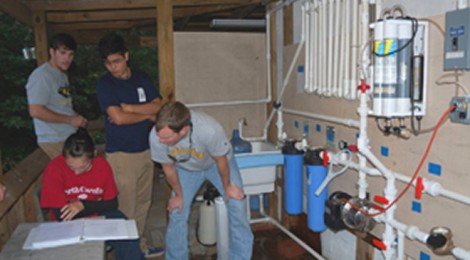
Get to Know a Member Series: Cristiane Queiroz Surbeck
 Cristiane Queiroz Surbeck, P.E., Ph.D., ENV SP
Cristiane Queiroz Surbeck, P.E., Ph.D., ENV SP
Associate Professor and Graduate Program Coordinator
The University of Mississippi
Department of Civil Engineering
“The biggest challenge in addressing social aspects of sustainability is that it is difficult to apply numbers to human behavior,” says Dr. Cris Surbeck, who works with both Living Waters for the World and the University of Mississippi chapter of Engineers Without Borders. The first is an organization with a mission to bring clean drinking water to parts of the world where little of the precious substance is potable. While Dr. Surbeck’s work falls on the technical side of the project (designing user-friendly decontamination devices), she finds herself in constant consideration of variances in human behavior; for instance, how well can a particular community manage the equipment, and what type of instructions are needed? “We need to consider people’s behavior in how they use the clean water so that the water does not get re-contaminated. We also have to understand the lives of the people who will operate the water treatment systems and consider their level of literacy and troubleshooting ability.” To the point, Dr. Surbeck deals with equipment that must see sustained use. If water is becoming re-contaminated, it’s a problem. Even if the equipment itself seems to work flawlessly, the ability for people to operate it both short and long term must be the first consideration.
The University of Mississippi chapter of Engineers without Borders is currently constructing a sustainable school building in rural Togo, Africa, a project that Dr. Surbeck says considers community needs first. “Our first goal was to meet people in communities and learn about their lives and their needs. Following EWB protocol, only after meeting people did we decide, with a particular community, what kind of project to work on with the residents,” she says. While engineers are mostly trained to put numbers to objects, Engineers Without Borders finds itself sometimes trying to calculate human activity. Dr. Surbeck uses a program called the Envision Sustainable Infrastructure Rating System (http://www.asce.org/Sustainability/ISI-Rating-System/) to help her navigate the unpredictable terrain that arises when evaluating human decision making in the real world. The program provides a qualitative analysis of the interplay between sustainable project leadership and the community it serves.
Dr. Surbeck is a member of the Integrated Network for Social Sustainability because it provides a collaborative opportunity across a wide spectrum of academic, private, and government sector interests. The convergence of those points of interest enables a more complete vision of social sustainability for those that find themselves on the innovative edges of the field. For social sustainability itself, Dr. Surbeck endorses the direct addressing of those issues in her own academic practice as well as in several other college majors. She constantly reminds herself of the need to make her students aware of the multi-faceted role that engineering is beginning to develop across the world. “Engineering is not just about number-crunching,” she says, “It’s about impacting people’s lives.”
–This post was created through an e-mail interview conducted with the consent of Dr. Cristiane Surbeck.


